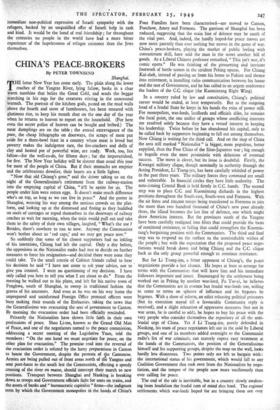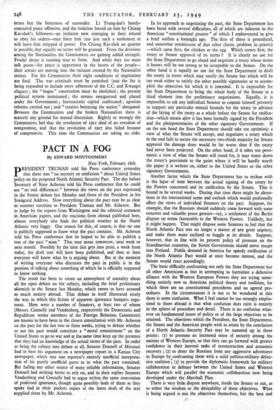CHINA'S PEACE-BROKERS
By PETER TOWNSEND Shanghai.
THE lunar New Year has come early. The plain along the lower reaches of the Yangtze River, lying fallow, basks in a clear warm sunshine that belies the Great Cold, and sends the beggar searching in his rags for the creatures stirring in the unseasonal warmth. The portrait of the kitchen gods, pasted on the mud walls above the hearth and stove of farmhouses, has been smeared with glutinous rice, to keep his mouth shut on the one day of the year when he returns to heaven to report on the household. (For here even the secret police of heaven can be bought and bribed.) The meat dumplings are on the table ; the annual extravagance of the poor, the cheap lithographs on doorways, the scraps of meat put aside for a three-bowl feast in a country where meat is loved but poverty makes the indulgence rare, the fire-crackers and dolls of clay and heated pot of powerful wine, are ready. Work, too, lies fallow—for the well-to-do, for fifteen days ; for. the impoverished, for five. The New Year holiday will be shorter than usual this year for most of the people of China. But if their stomachs are emptier and the celebrations dowdier, their hearts are a little lighter.
" Now that old Chiang's gone," said the driver taking us on the night of the Generalissimo's retirement from the railway-station into the emptying capital of China, " it'll be easier for us. The people under him were rotten eggs. It doesn't make much difference who's on top, so long as we can live in peace." And the porter in Shanghai, weaving his way among the anxious crowds on the plat- form, and looking up at the distressed and fleeing as they huddled on roofs of carriages or roped themselves in the doorways of railway coaches to wait for morning, when the train would pull out and take them to the safety of their own villages, laughed, " What's the use ? Besides, there's nowhere to run to now. Anyway the Communists won't bother about us ' red caps,' and we may get peace now."
So suddenly that some of his closest supporters had no inkling of his intentions, Chiang had left the capital. Only a day before, the opposition in the Nationalist ranks had met to decide on further measures to force his resignation—and decided there were none they could take. To the small coterie of Cabinet friends called to hear his decision he said " I have not come to ask your advice, nor to give you counsel. I want no questioning of my decision. I have only called you here to tell you what I am about to do." From the meeting he walked out to his plane, and left for his native town of Fenghwa, south of Shanghai, to sweep in traditional fashion the graves of his ancestors. And even as he was on his way home the unprepared and uninformed Foreign Office protocol officers were busy making their rounds of the Embassies, taking the news that the Generalissimo was evacuating the seat of government to Canton. By morning the evacuation order had been officially rescinded.
Privately the Nationalists have shown little faith in their own professions of peace. Shao Li-tse, known as the Grand Old Man of Peace, and one of the negotiators named to the peace commission, addressing a secret meeting of the Legislative Yuan, told the members: " On the one hand we must negotiate for peace, on the other plan for evacuation." The promise read into the reversal of the evacuation order is refuted by the hasty preparations in Canton to house the Government, despite the protests of the Cantonese. Armies are being pulled out of front areas north of the Yangtze and sent post-haste to the south lest the Communists, effecting a speedy crossing of the river en masse, should intercept their march to new positions. Transport between Shanghai and Nanking is breaking down as troops and Government officials fight for seats on trains, and the assets of banks and " bureaucratic capitalist " firms—the indignant term by which the Government monopolies in the hands of China's Four Families have been characterised—are moved to Canton, Foochow, Amoy and Formosa. The garrison of Shanghai has been reduced, suggesting that the main line of defence may be south of the vital port. And, indeed, the hardly hoped-for peace moves are now more patently than ever nothing but moves in the game of war. China's peace-brokers, playing the market of public feeling with consummate skill, have sold the man in the street another bill of goods. As a Liberal Chinese professor remarked, "This isn't war, it's comic opera." He was thinking of the pirouetting and intricate footwork of battle scenes in the strident Peking operas. For Chiang Kai-shek, instead of passing on from his home to Fukien and thence into retirement, is installing radio communication between his house and the seat of Government, and he has called to an urgent conference the leaders of the C.C. clique (the Kuomintang Right Wing).
In a country ruled by law and constitution, Chiang's political career would be ended, at least temporarily. But as the outgoing head of a feudal State he keeps in his hands the reins of power still: For monopolists, war-lords, landlords and officials alike, he remains the focal point, the one unifier of groups whose conflicting interests are resolved solely because they have a vested interest in keeping his leadership. Twice before he has abandoned his capital, only to be called back by supporters beginning to fall out among themselves. Now Chiang is waiting for the third call. And on the map of China the area still marked " Nationalist " is bigger, more populous, better supplied, than the Free China of the Sino-Japanese war ; big enough to beguile even the most pessimistic with delusions of eventual success. The move is clever, but its issue is doubtful. Firstly, the Kwangsi military clique, though nominally in authority through the Acting President, Li Tsung-jen, has been carefully whittled of power in the past three years. The military forces they command are small and vulnerable. In financial circles they have little authority. The note-issuing Central Bank is held firmly in C.C. hands. The second step was to place C.C. and Kuomintang diehards in the highest positions throughout the South-east, South-west and Formosa. With the air force and 200,000 troops being transferred to Formosa to join the more than two hundred thousand of China's new poor already there, the island becomes the last line of defence, one which might draw American interest. But the provinces south of the Yangtze have been carefully realigned into blocs that could provide the basis of continued resistance, or failing that could strengthen the Kuomin- tang's bargaining position with the Communists. The third and final step was to respond on the surface to the unmistakable wishes of the people ; but with the expectation that tht proposed peace nego- tiations would break down and bring Chiang and the C.C. clique back as the only group powerful enough to continue resistance.
But for Li Tsung-jen, a bitter opponent of Chiang's, the peace negotiations provide a last chance. He hopes at least to arrange for terms with the Communists that will leave him and his immediate followers important and intact. Encouraged by the settlement being worked out in Peking by another war-lord, Fu Tso-yi, he believes that the Communists are in essence but feudal war-lords too, willing to come to terms on spheres of influence and let bygones be bygones. With a show of reform, an edict releasing political prisoners (but its execution stayed till a favourable Communist reply is received), and a slight relaxation of oppressive measures (but not in war areas, he is careful to add), he hopes to buy his peace with the very people who consider themselves the repository of all the anti- feudal urge of China. Yet if Li Tsung-jen, poorly defended in Nanking, his team of peace negotiators left out in the cold by Liberal groups, and one of its members added overnight to the Communist radio's list of war criminals, can scarcely expect easy treatment at the hands of the Communists, the position of the Generalissimo himself and his supporting groups, despite the map on the wall, looks hardly less disastrous. Two points only are left to bargain with: the international status of his government, which would fall to any Coalition Government that took over from the Nationalists by nego- tiation, and the temper of the people now more vociferously than ever calling for peace.
The end of the tale is inevitable, but in a country slowly awaken- ing from feudalism the feudal turn of mind dies hard. The regional settlements which war-lords hoped for are bringing them not easy terms but the bitterness of surrender. Li Tsung-jen's barely- concealed peace offensive, and the isolation forced on him by Chiang Kai-shek's followers—an isolation now emerging in their refusal to obey his orders—may force him into just such a settlement as will leave him stripped of power. For Chiang Kai-shek no quarter is possible, but equally no terms will be granted. From the divisions among the Nationalists the Communists are gaining added strength. Feudal decay is running true to form. And while they too must talk peace—for peace. is uppermost in the hearts of the people— their armies are moving into the vacuum created by the Nationalist retreat. For the Communists their eight conditions of negotiation are final. The war criminals must be punished (and the list is being expanded to include more adherents of the C.C. and Kwangsi cliques) ; the " bogus " constitution must be abolished ; the present political system terminated ; the armies reorganised and placed under the Government ; bureaucratic capital confiscated ; agrarian reforms carried out ; and " treaties betraying the nation" abrogated. Between the Communists and the broken Nationalists there is scarcely any ground for mutual discussion. Rightly or wrongly the Communists feel that the revolution of 1911 died of an overdose of compromise, and that the revolution of 1927 also failed because of compromise. This time the Communists are taking no risks.



































 Previous page
Previous page